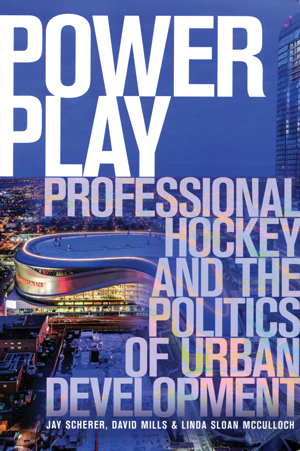
by Jay Scherer, David Mills and Linda Sloan McCulloch
University of Alberta Press
2019/$32.99/464 pp.
Rogers Place officially opened in downtown Edmonton in September 2016. The arena—the new home of the Edmonton Oilers—cost $483.5-million to build, and, along with hundreds of millions of dollars of surrounding developments, was heavily subsidized by the citizens of Edmonton. For fans of the Oilers, such as myself, the new arena symbolized a potential return to glory for the long-struggling team. For many Edmontonians, however, the arena symbolized a gift to a billionaire hockey team owner. For the authors of Power Play: Professional Hockey and the Politics of Urban Development, the arena appears to primarily symbolize the undermining of democracy in Edmonton’s municipal politics.
Studies by economists have nearly universally agreed that public funding should not be spent on arenas for professional sports teams. So how did Edmonton decide to do just that? And how was the public consulted on this decision? Power Play provides insight into the negotiations between the City of Edmonton and Oilers’ owner Daryl Katz, painting the arena agreement as “a deal negotiated mostly in secret and with minimal public input.”
The book begins with a history of arena politics and downtown renewal efforts in Edmonton since the 1890s. But the main focus is on the Rogers Place negotiations. The authors detail meetings behind closed doors, a city administration ignoring independent reports, and city council giving preferential treatment for the Oilers owner to speak to council while shutting other groups out. Negotiations were not a give-and-take, but rather a situation where “Administration was willingly ceding opportunities to push back harder in the negotiations and had accepted the Katz Group’s demands despite the opposition of some councillors, all without public input.”
Authors Jay Scherer, David Mills, and Linda Sloan McCulloch use their diverse backgrounds to give life to this story. Scherer and Mills have academic backgrounds in sport sociology and sport history respectively, and this expertise is on display. But it is Sloan McCulloch, a city councillor during the arena negotiations, who provides the reader a front-row seat to the world of municipal politics. Her notes and recollections detail closed-door meetings, presentations, the awarding of contracts and other goings-on at city council unavailable to the public, adding an invaluable insider’s perspective.
The authors are open about their skepticism of the arena deal, noting that “our own biases and assumptions have shaped and coloured our analysis.” Yet the book maintains a reasonably balanced tone. The authors support the revitalization of downtown Edmonton; they “simply have a different vision for the city and for the use of scarce public resources.” Their concern is less about the money and more about the decision-making process to award it.
Readers interested in the business of sport will enjoy Power Play. But this book is really about how municipal politics can be hijacked. Themes of democracy, transparency and public participation in municipal politics run throughout the book, raising questions of why arena opponents failed to establish a voice in the debate, and why the province was absent from its oversight role. As the saying goes, “All politics is local.” Power Play shows what can happen when local politics becomes enmeshed with local and international business interests. With voter turnout at 31.5 per cent in the 2017 Edmonton municipal election, Power Play is less a story about an arena and more a wakeup call to citizens who care about their cities to get involved and ensure that they are heard.
—Ryan Gauthier is an assistant professor of law at Thompson Rivers University and the co-author of Cap in Hand (ECW, 2018).
_______________________________________

